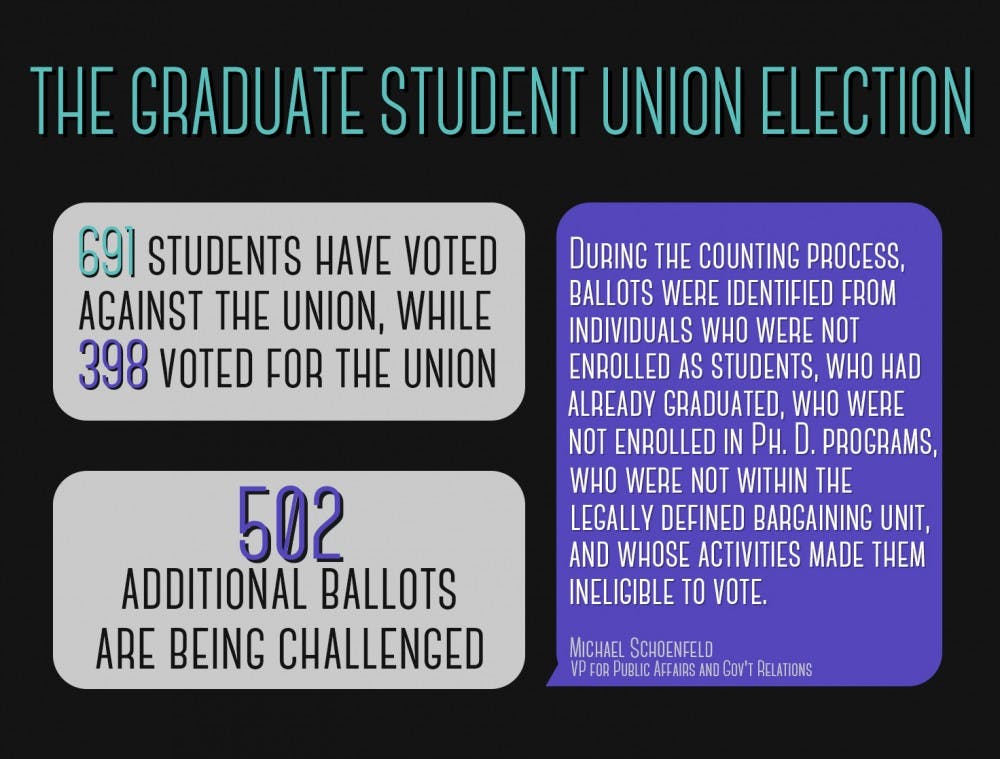Although ballots have been submitted in the graduate student union election, the actual results are still indeterminate.
The National Labor Relations Board counted all of the ballots throughout the day Friday. As the results currently stand, 691 students have voted against the union and 398 have voted in favor. However, more than 500 additional ballots are being challenged, meaning that the election results are still undecided.
Ingrid Jenkins, an NLRB board agent, confirmed that hearings will need to be held in order to resolve the status of the challenged ballots and eventually the election. A date has not as of yet been set, she said.
The Duke Graduate Student Union—which is not yet recognized as a legal union due to the inconclusive election—kicked off last August in response to a nationwide NLRB decision that "student assistants" at private universities could unionize. But there was pushback, as the group Students Against Duke Unionization launched a campaign to oppose the unionization effort, arguing that the Service Employees International Union would not represent students' best interests.
North Carolina is a right-to-work state, which means that no graduate student can be compelled to pay union dues or join any potential union as a condition of employment, explained Daniel Bowling, a senior lecturing fellow at the Duke Law School.
Should a graduate student union eventually be formed, however, Bowling added that students who fit within the "bargaining unit" who voted against the union will still be unable to bargain individually with administrators. They will also be bound by any collective bargaining contract eventually reached, he wrote in an email.
“It’s like you’re in the union, but you’re just not paying dues to the union,” Bowling explained. “You can’t break off and form your own group. Administrators have to go through the union on your behalf whether you’re a part of it or not.”
Graduate student Katherine Marusak from SADU also argued that, even if students cannot be technically forced to join the union, they could be in practice if they want to have any say in the negotiations. Bowling echoed this sentiment, noting that the law is unclear on whether unions could require students to pay dues in order to participate.
Challenges to graduate student unionization elections are not without precedent. A similar result occurred in Harvard's election in December, and NLRB hearings are still taking place as late as last week.
Writing for SADU, Marusak and graduate student Michael Boyarsky noted that the organization is pleased with the current results—which have more students against than in favor, pending resolution of the challenged ballots.
"We are pleased with the results of the election, which prove that graduate students are united in support of our current arrangement," they wrote. "We recognize that each graduate student has different responsibilities, funding sources, and circumstances and we hope that if this issue returns in the future, more care and consideration are given to the definition of the bargaining unit."
Paula McClain, dean of the Graduate School, wrote in an email to the graduate school community Friday that the additional 500 ballots were being challenged on the basis of voter eligibility, adding that "it could be some time before there is a final outcome."
Michael Schoenfeld, vice president for public affairs and government relations, clarified that both the University and SEIU have raised eligibility questions.
"During the counting process, ballots were identified from individuals who were not enrolled as students, who had already graduated, who were not enrolled in Ph D. programs, who were not within the legally defined bargaining unit, and whose activities made them ineligible to vote," he wrote in an email.
Based on an NLRB board decision the day prior to the election, Bowling identified what he considered the primary issue at hand. He said that the University is challenging whether graduate students who were teaching in 2016 but are not teaching in the current Spring 2017 semester should be allowed to vote, and that hearings will need to be held to settle the dispute.
A date for hearings has not yet been set. Bowling also noted that Acting NLRB Chairman Philip Miscimarra, in the board decision, expressed skepticism about the validity of mail-in elections in the first place. Bowling said Miscimarra might entertain a challenge on that front.
The current margin is 293 votes against the union. If more than 293 votes are eventually deemed eligible after hearings, they will be counted. If less than 293 votes are deemed eligible, however, they will not be counted, and there will be no union, Bowling said.
“I think this thing could be litigated for a long time by either side,” he said. “Duke has all the cards in its favor right now, in my opinion.”
But Jane Tandler, a Ph.D. student in neurobiology, wrote on behalf of DGSU that they would continue to fight for the union against what she called the University's attempt to "disenfranchise" voters.
"Despite these aggressive tactics we have always and will continue to fight for a truly democratic process wherein all votes will be counted," she wrote. "Together we will secure a unified voice to speak out for positive change in our working conditions—ultimately improving our own work, and Duke University by extension."
Get The Chronicle straight to your inbox
Sign up for our weekly newsletter. Cancel at any time.
This article was updated at 12:00 p.m. Saturday with comments from Schoenfeld and at 11:00 p.m. Sunday with additional information and comments from Miscimarra.

